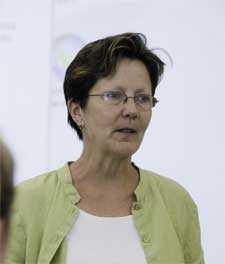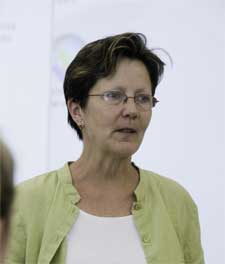
New Bedford, Mass. program grants up to six college credits free of charge
KINGSTON, R.I.—May 1, 2009 –-Kathleen Torrens of Providence, an associate professor of communication studies at the University of Rhode Island, has taught public speaking to hundreds–if not thousands–of college students during the past 14 years. Two years ago she began teaching that skill to an untraditional class of economically disadvantaged individuals for whom college seemed out of reach, both financially and academically.
“Knowing how to make a cogent, persuasive argument is important because this population should be able to stand up for themselves — whether in the courts, the school systems, or in other public forums where public advocacy is necessary to protect themselves and their families,” explains Torrens.
The URI professor is part of a team of instructors who follow the Bard College Clemente Course in the Humanities, which gives low-income students the chance to study literature, art history, philosophy, and American history and earn up to six college credits. Students attend classes for 28 weeks free of charge.
Bard College, a liberal arts college located in New York’s Hudson Valley, initiated the course in 1995. The course is now taught in at least 14 different sites around the country.
“Most, if not all, Clemente programs feature writing instruction, but our program may be unique with our addition of public communication,” says Torrens who informally introduced public speaking two years ago and integrated it into the curriculum this year.
The class meets Monday and Wednesday evenings from September through May in the PACE facility on Smith Street in New Bedford. Mass. Class population varies from year to year. Students vary in age, diversity, and backgrounds. One student came from China, another was a Hurricane Katrina evacuee, and one couple had a few college credits. Some students are in recovery programs. Most students have children.
Torrens, a URI John Hazen White Center for Ethics and Public Service Fellow, feels strongly about empowering people who too often are voiceless. “People who are disadvantaged educationally and economically are easily made invisible to our “mainstream” culture,” she says. “They often struggle with language issues, have had legal trouble, and can be readily marginalized because they don’t have money.
“Basically, I would argue that the skills of public advocacy (which include critical thinking and listening, as well as the production of arguments) are necessary to an informed citizenry. Part of Clemente, with its focus on the humanities, is to move all citizens to public participation,” she says. “In addition, many Clemente graduates enter community colleges or universities and continue their education.”
Torrens adds that the program not only enriches students, but gives confidence to those students who continue in college.
“I think Rhode Island is ripe for a Clemente program if we can get enough financial support,” the URI professor says, noting she was part of a group that tried to initiate one for the 2008-09 year, but fell $15,000 short of its goal.
“The program, in comparison to some public initiatives directed toward poverty eradication and education, is cheap,” she says. The New Bedford Clemente Program runs on $50,000 a year.”
Anyone who would like to know more about the program or help in the establishment of a program in Rhode Island should contact Torrens at kmtorrens@uri.edu or 401.874.4809.
John Hazen White Sr. Center for Ethics and Public Service Faculty Fellows
Kathleen Torrens is one of eight Faculty Fellows appointed by the University of Rhode Island’s John Hazen White Sr. Center for Ethics and Public Service this year. She received a $2,000 stipend for her work to help teach public speaking to people with low incomes.
These teachers and scholars, whose fields of expertise include a wide range of disciplines, participate in program development, seminar workshops and research and writing on issues related to ethics and public service.
The other Faculty Fellows appointed for a one-year term are:
• Bridget Buxton, assistant professor of history and William Krieger, assistant professor of philosophy. Project: The ethics of handling human remains in the context of deep submergence archaeology.
• Kathryn Jervis, assistant professor of accounting. Project: Investigating disparities in municipal disclosure policies.
• Roger LeBrun, professor of plant sciences. Project: The use of DDT in combating malaria in developing countries.
• Zahra Meghani, assistant professor of philosophy. Project: Public participation in ethical questions of new technology risk assessment in deliberative and participatory democracies.
• John Pantalone, journalism lecturer. Project: Internal reactions to recent ethics violations in major U.S. newspapers and the role of ombudsmen in preventing similar infractions.
• George Tsiatas, civil and environmental engineering. Project: Gathering, organizing, and disseminating engineering ethics case studies.

